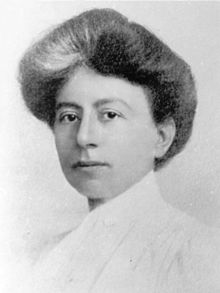Margaret Floy Washburn
| Margaret Floy Washburn | |
|---|---|
 |
|
| Born |
July 25, 1871 New York City, New York, U.S. |
| Died | October 29, 1939 (aged 68) Poughkeepsie, New York, U.S. |
| Alma mater | Vassar College (graduated in absentia in 1893), Cornell University |
| Doctoral advisor | Edward B. Titchener |
| Known for | Past president, American Psychological Association |
Margaret Floy Washburn (July 25, 1871 – October 29, 1939), leading American psychologist in the early 20th century, was best known for her experimental work in animal behavior and motor theory development. She was the first woman to be granted a PhD in psychology (1894), and the second woman, after Mary Whiton Calkins, to serve as an APA President (1921). A Review of General Psychology survey, published in 2002, ranked Washburn as the 88th most cited psychologist of the 20th century, tied with John Garcia, James J. Gibson, David Rumelhart, Louis Leon Thurstone, and Robert S. Woodworth.
Born July 25, 1871 in New York City, she was raised in Harlem by her father Francis, an Episcopal priest, and her mother, Elizabeth Floy, who came from a prosperous New York family. Her ancestors were of Dutch and English descent and were all in America before 1720. Washburn was an only child; she did not appear to have childhood companions her age and spent much of her time with adults or reading. She learned to read long before she started school; this caused her to advance quickly when she started school at age 7. In school, she learned French and German. When she was eleven years old, she started at public school for the first time. In 1886, she graduated from high school at the age of fifteen, and that fall, she entered Vassar College, Poughkeepsie, New York, as a preparatory student. This preparatory status was due to her lack of Latin and French. During her undergraduate years at Vassar, Washburn developed a strong interest in philosophy through poetry and other literary works. She also became a member of Kappa Alpha Theta sorority, and was first introduced to the field of psychology. After she graduated from Vassar in 1891, Washburn became determined to study under James McKeen Cattell in the newly established psychological laboratory at Columbia University. As Columbia had not yet admitted a woman graduate student, she was admitted only as an auditor. Despite the derogatory feelings toward women gaining education at the time, Cattell treated her as a normal student and became her first mentor. She attended his seminary, lectures, and worked in the laboratory alongside men. At the end of her first year of admission at Columbia, Cattell encouraged her to enter the newly organized Sage School of Philosophy at Cornell University to obtain her Ph.D because this would not have been possible at Columbia as an auditor student. She was accepted in 1891 with a scholarship.
...
Wikipedia
